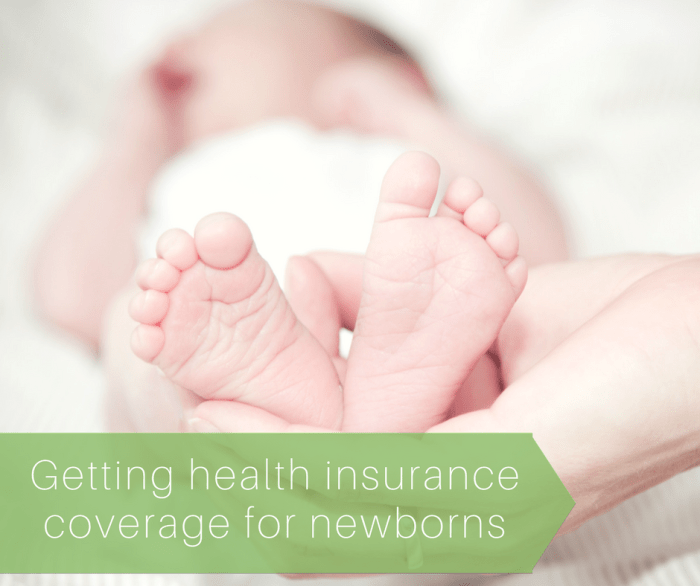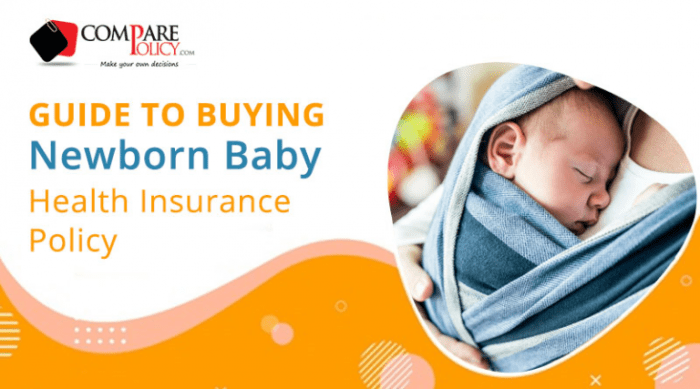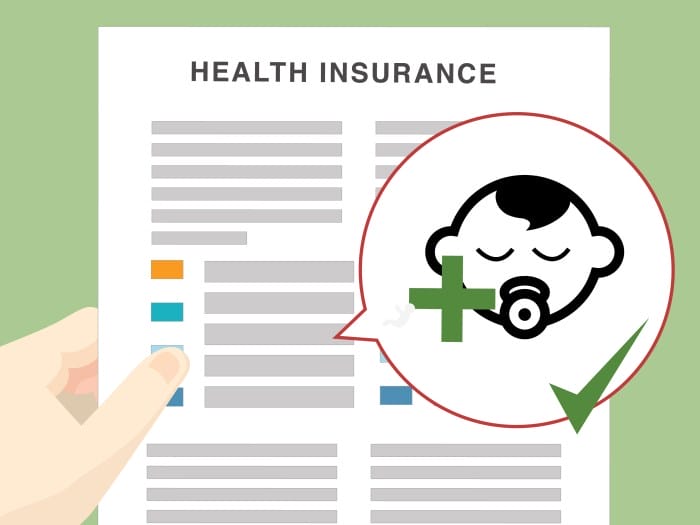The arrival of a newborn baby brings immense joy and responsibility. As parents, ensuring the well-being of your little one is paramount. Securing health insurance coverage for your newborn is a crucial step in safeguarding their health and providing access to quality medical care.
This comprehensive guide delves into the intricacies of newborn baby health insurance coverage, providing you with essential knowledge and practical tips to make informed decisions.
Understanding the basics of newborn baby health insurance, enrolling your newborn in a suitable plan, and navigating claims and reimbursements are just a few aspects covered in this guide. Additionally, we explore specialized coverage considerations for premature or high-risk newborns, state-sponsored programs, and international travel insurance options.
By delving into these topics, we aim to empower parents with the knowledge and confidence to ensure their newborn’s health insurance needs are met.
Newborn Baby Health Insurance Coverage

Newborn babies are vulnerable and require specialized medical care. Securing health insurance coverage for a newborn baby is crucial to ensure access to quality healthcare services, preventive care, and treatments.
Health insurance plans for newborns vary in coverage and benefits. Some common types include:
- Private health insurance: These plans are offered by private insurance companies and provide a wide range of coverage options, including hospitalization, outpatient care, prescription drugs, and preventive care.
- Public health insurance: These plans are offered by government agencies and provide basic coverage for essential healthcare services. Examples include Medicaid and the Children’s Health Insurance Program (CHIP).
- Employer-sponsored health insurance: If the parents have employer-sponsored health insurance, they may be able to add the newborn baby to their plan.
Benefits Typically Covered
Newborn baby health insurance coverage typically includes:
- Well-baby care: Routine checkups, immunizations, and screenings to monitor the baby’s growth and development.
- Hospitalization: Coverage for hospital stays, including room and board, medical care, and surgery.
- Emergency care: Coverage for unexpected medical emergencies, such as accidents or illnesses that require immediate attention.
- Prescription drugs: Coverage for prescription medications prescribed by a doctor.
- Specialist care: Coverage for care provided by specialists, such as pediatricians, cardiologists, and neurologists.
Exclusions
Newborn baby health insurance coverage may have certain exclusions, such as:
- Cosmetic procedures: Procedures that are not medically necessary, such as plastic surgery or laser hair removal.
- Experimental treatments: Treatments that are still in the experimental stage and have not been approved by regulatory authorities.
- Pre-existing conditions: Some plans may not cover pre-existing conditions, which are medical conditions that existed before the baby was born.
Enrolling Your Newborn in Health Insurance
Enrolling your newborn baby in health insurance is a crucial step to ensure their access to quality healthcare services. Timely enrollment is essential to avoid coverage gaps and ensure seamless healthcare access. This guide provides a step-by-step approach to enrolling your newborn in health insurance.
Gather Necessary Documents
Before enrolling your newborn, gather the necessary documents. These may include:
- Birth certificate or hospital records
- Social Security number (SSN) or SSN application
- Proof of citizenship or lawful presence
- Proof of income (if applying for government-sponsored health insurance)
Choose a Health Insurance Plan
Select a health insurance plan that meets your family’s needs and budget. Consider factors such as coverage, premiums, deductibles, and copayments. You can choose from employer-sponsored plans, individual plans, or government-sponsored plans like Medicaid or CHIP.
Enroll Your Newborn
Once you have chosen a health insurance plan, enroll your newborn by contacting the insurance company or visiting their website. You will need to provide the necessary documents and information, such as the baby’s name, date of birth, and SSN.
Set Up Automatic Premium Payments
To avoid missing premium payments and coverage lapses, set up automatic payments through your bank account or credit card. This ensures that your baby’s coverage remains active without interruption.
Follow Up with the Insurance Company
After enrolling your newborn, follow up with the insurance company to ensure that the enrollment was processed correctly and that the baby’s coverage is active. You may receive a confirmation letter or email from the insurance company.
Keep Records
Maintain a file with all the necessary documents related to your newborn’s health insurance, including the insurance card, policy information, and any correspondence with the insurance company. This will help you manage your baby’s healthcare needs and track any changes in coverage or benefits.
Comparing Health Insurance Plans for Newborns

When comparing health insurance plans for newborns, it’s essential to consider several key factors to ensure you choose a plan that meets your family’s needs and budget.
The primary considerations include coverage options, the network of providers, out-of-pocket expenses, and customer service.
Coverage Options
Review the coverage options offered by each plan to ensure they align with your newborn’s potential healthcare needs. Consider aspects such as:
- Preventive care: Check if the plan covers routine checkups, immunizations, and screenings.
- Hospitalization: Verify if the plan provides coverage for hospital stays, including room and board, medical procedures, and intensive care.
- Specialist care: Ensure the plan covers visits to specialists, such as pediatricians, cardiologists, or neurologists, if necessary.
- Prescription drugs: Review the plan’s coverage for prescription medications, including those commonly prescribed to newborns.
Navigating Health Insurance Claims and Reimbursements for Newborn Care
Understanding health insurance claims and reimbursements is essential for ensuring your newborn receives the necessary medical care without financial burden. Newborn health insurance typically covers a range of expenses, including hospital stays, doctor visits, prescription medications, and specialized treatments.
Common Types of Medical Expenses Covered by Newborn Health Insurance
- Hospital Stays: This includes the cost of room and board, nursing care, medical supplies, and other services provided during a newborn’s hospital stay.
- Doctor Visits: Routine checkups, vaccinations, and specialist consultations are typically covered by newborn health insurance.
- Prescription Medications: The cost of prescription medications prescribed by a doctor is often covered, subject to plan limits and co-pays.
- Specialized Treatments: If a newborn requires specialized treatments, such as surgery or intensive care, these expenses may be covered by health insurance.
Understanding Health Insurance Claims
- Filing a Claim: When you receive medical services for your newborn, you will need to file a claim with your health insurance provider. This typically involves submitting a claim form, along with supporting documentation such as receipts and medical records.
- Processing Time: The time it takes for a claim to be processed and reimbursed can vary depending on the insurance provider and the complexity of the claim.
- Explanation of Benefits (EOB): Once your claim is processed, you will receive an Explanation of Benefits (EOB) from your insurance provider. This document explains the details of your claim, including the amount covered by insurance and the amount you are responsible for.
Tips for Navigating Health Insurance Claims and Reimbursements
- Keep Accurate Records: Maintain a file with all medical bills, receipts, and EOBs related to your newborn’s medical care. This will make it easier to file claims and track your expenses.
- Communicate with Your Insurance Provider: If you have questions about your coverage or the claims process, contact your insurance provider directly. They can provide guidance and assistance throughout the process.
- Consider Using a Health Savings Account (HSA): An HSA can be a useful tool for saving money for your newborn’s medical expenses. Contributions to an HSA are tax-deductible, and withdrawals are tax-free when used for qualified medical expenses.
Maximizing Newborn Health Insurance Benefits
Newborn health insurance coverage offers a comprehensive safety net for your child’s well-being. By utilizing preventive care, routine checkups, and immunization coverage, you can safeguard your child’s health and maximize the benefits of their health insurance plan.
Effective communication with healthcare providers is crucial for ensuring proper reimbursement and maximizing benefits. Additionally, maintaining accurate medical records is essential for seamless claim processing and reimbursement.
Preventive Care and Routine Checkups
Preventive care and routine checkups are fundamental pillars of newborn healthcare. These regular visits allow healthcare providers to monitor your child’s growth, detect potential health issues early, and provide necessary interventions.
- Schedule regular well-child visits as recommended by your pediatrician. These visits typically occur at 2 weeks, 2 months, 4 months, 6 months, 9 months, 12 months, 15 months, 18 months, and 24 months.
- During these visits, the pediatrician will conduct a thorough physical examination, check your child’s growth and development, and administer necessary vaccinations.
- Preventive care also includes regular dental checkups, eye exams, and hearing screenings.
Immunization Coverage
Immunization is a critical aspect of newborn healthcare, protecting your child from various infectious diseases. Most health insurance plans cover routine immunizations as part of preventive care.
- Follow the recommended immunization schedule provided by your pediatrician or the Centers for Disease Control and Prevention (CDC).
- Keep accurate records of your child’s immunizations, as they may be required for school enrollment, daycare admission, or international travel.
Maintaining Accurate Medical Records
Accurate medical records are essential for seamless claim processing and reimbursement. Keep a comprehensive file of your child’s medical records, including:
- Birth certificate
- Insurance card
- Immunization records
- Medical bills and receipts
- Provider contact information
Communicating Effectively with Healthcare Providers
Effective communication with healthcare providers is crucial for ensuring proper reimbursement and maximizing benefits. Here are some tips:
- Clearly communicate your child’s symptoms and medical history to the healthcare provider.
- Ask questions about your child’s diagnosis, treatment plan, and medication.
- Provide complete and accurate information about your child’s health insurance coverage.
- Keep a record of all communication with healthcare providers, including dates, times, and key details.
Special Considerations for Premature or High-Risk Newborns

Premature or high-risk newborns face unique health challenges that require specialized medical care, extended hospital stays, and ongoing monitoring. Their health insurance needs are often more complex, making it crucial for parents to understand their coverage options and navigate the complexities of the healthcare system.
Specialized Health Insurance Plans and Riders
Specialized health insurance plans or riders are designed to provide comprehensive coverage for premature or high-risk newborns. These plans typically offer:
- Higher coverage limits for specialized medical care, such as neonatal intensive care unit (NICU) stays and specialized therapies.
- Extended coverage periods for hospital stays, ensuring that the newborn is covered until they are medically stable and ready for discharge.
- Coverage for potential complications associated with prematurity or high-risk conditions, such as respiratory problems, feeding difficulties, and developmental delays.
Parents of premature or high-risk newborns should carefully review the terms and conditions of these specialized plans to ensure they meet their child’s specific needs.
Newborn Health Insurance and State-Sponsored Programs

State-sponsored health insurance programs provide a safety net for families with newborns who may not have access to employer-sponsored health insurance or the financial means to purchase private health insurance. These programs offer comprehensive coverage for a wide range of essential health care services, ensuring that newborns receive the necessary medical attention they need.
Eligibility Criteria
Eligibility for state-sponsored health insurance programs varies from state to state, but generally includes families with low incomes and limited resources. In most cases, newborns are automatically eligible for coverage under their parents’ health insurance plan, regardless of their income.
However, some states may have additional eligibility requirements for newborns, such as proof of citizenship or residency.
Application Process
The application process for state-sponsored health insurance programs is typically straightforward and can be completed online, by mail, or in person at a local government office. Families will need to provide information about their income, family size, and any other relevant factors that may affect their eligibility.
Once an application is submitted, it will be reviewed and a determination of eligibility will be made.
Benefits of State-Sponsored Health Insurance Programs
State-sponsored health insurance programs offer a wide range of benefits for newborns, including coverage for:
- Well-child visits and immunizations
- Hospital care
- Prescription drugs
- Mental health services
- Dental and vision care
These programs also provide access to a network of healthcare providers, ensuring that families can find qualified doctors, hospitals, and other healthcare facilities that accept their insurance.
Understanding COBRA and Newborn Health Insurance Coverage

The Consolidated Omnibus Budget Reconciliation Act (COBRA) is a federal law that allows eligible individuals to continue their employer-sponsored health insurance after certain qualifying events, such as childbirth. COBRA provides temporary health insurance coverage for a limited period of time, typically 18 or 36 months, depending on the qualifying event.
Who is Eligible for COBRA?
To be eligible for COBRA, you must have been covered under an employer-sponsored group health plan on the day before the qualifying event occurred. You are also eligible if you are the spouse or dependent child of an employee who is covered under an employer-sponsored group health plan.
Qualifying Events for COBRA
Qualifying events that may trigger COBRA coverage include:
- Voluntary or involuntary job loss
- Reduction in work hours
- Divorce or legal separation
- Death of the employee
- Childbirth
- Adoption
- Placement of a child for foster care or adoption
COBRA Coverage for Newborns
If you are pregnant and covered by an employer-sponsored health insurance plan, your newborn child may be eligible for COBRA coverage. COBRA coverage for newborns typically begins on the date of birth and lasts for the same length of time as your COBRA coverage.
COBRA Premiums
Under COBRA, you are responsible for paying the full cost of your health insurance premiums, plus a 2% administrative fee. The cost of COBRA premiums can vary depending on the type of health insurance plan you have and the number of people covered under the plan.
How to Apply for COBRA
If you are eligible for COBRA, you must apply for coverage within 60 days of the qualifying event. You can apply for COBRA by contacting your employer or the plan administrator.
Newborn Health Insurance and International Travel

When planning international travel with a newborn, securing comprehensive health insurance coverage is crucial. Research healthcare systems, understand coverage limitations, and consider travel insurance if necessary.
Research Healthcare Systems
- Assess the healthcare infrastructure: Research the quality and accessibility of healthcare facilities, including hospitals, clinics, and emergency services, at your destination.
- Understand healthcare costs: Determine the average cost of medical care, including doctor visits, hospital stays, and prescription medications, to estimate potential expenses.
- Check for language barriers: Consider language barriers and the availability of English-speaking healthcare providers or translation services.
Understand Coverage Limitations
- Review your primary health insurance plan: Verify if your newborn’s health insurance covers international travel. Check for any exclusions, limitations, or restrictions.
- Contact your insurance provider: Communicate with your insurance provider to clarify coverage details, obtain pre-authorization for specific treatments, and understand the claims process for international care.
- Consider supplemental travel insurance: If your primary health insurance has limited international coverage, consider purchasing travel insurance to cover additional medical expenses, emergency medical evacuation, and trip cancellation.
Obtain Travel Insurance
- Compare travel insurance plans: Research different travel insurance policies, comparing coverage options, premiums, deductibles, and exclusions. Choose a plan that aligns with your travel needs and budget.
- Review the policy carefully: Read the travel insurance policy thoroughly to understand the terms, conditions, and limitations. Ensure it covers medical expenses, emergency medical evacuation, trip delays, and lost luggage.
- Purchase travel insurance early: Buy travel insurance as soon as possible after booking your trip to ensure coverage from the start of your journey.
Newborn Health Insurance and Long-Term Planning

Newborn health insurance is not just about immediate coverage; it also involves planning for the child’s long-term health needs. Consider these strategies to ensure comprehensive care:
Health Savings Accounts (HSAs)
HSAs are tax-advantaged savings accounts designed to cover qualified medical expenses. Contributions are made with pre-tax dollars, reducing taxable income, and earnings grow tax-free. Withdrawals for eligible expenses are tax-free as well.
Benefits of HSAs for Newborns:
- Tax savings: Contributions reduce taxable income and earnings are tax-free.
- Flexibility: Funds can be used for a wide range of medical expenses, including deductibles, copayments, and prescription drugs.
- Long-term savings: HSAs can accumulate over time, providing a source of funds for future healthcare needs.
Saving for Future Healthcare Expenses
Healthcare costs can be unpredictable, and saving early can help offset future expenses. Consider setting up a separate savings account specifically for the child’s healthcare needs.
- Regular Contributions: Make regular contributions to the savings account, even small amounts can accumulate over time.
- Investment Options: Consider investing the savings in a diversified portfolio to potentially grow the funds over time.
- Long-Term Goal: Set a long-term goal for the savings, such as covering college expenses or a down payment on a home.
Planning for the Child’s Long-Term Health Insurance Needs
As the child grows, their health insurance needs may change. Consider these factors when planning for their long-term coverage:
- Changing Family Dynamics: As the family grows or changes, consider how health insurance coverage may need to adapt.
- Future Employment: When the child becomes an adult, they may need to transition to their own health insurance plan.
- Special Needs: If the child has special healthcare needs, consider how to ensure continuous coverage and access to necessary treatments.
Final Thoughts

The journey of parenthood is filled with challenges and rewards, and ensuring your newborn’s health is a top priority. With the right health insurance coverage, you can provide your little one with access to quality medical care, preventive services, and specialized treatments when needed.
Remember, understanding your policy, communicating effectively with healthcare providers, and planning for future healthcare needs are key to maximizing the benefits of newborn health insurance. By following the guidance provided in this comprehensive guide, you can navigate the complexities of newborn health insurance with confidence, ensuring your child’s well-being is protected.
FAQ Corner
What are the common types of newborn health insurance plans available?
There are two main types of newborn health insurance plans: private health insurance plans and government-sponsored programs like Medicaid and CHIP. Private plans offer a wide range of coverage options and benefits, while government programs provide affordable coverage for eligible families.
How can I enroll my newborn in health insurance?
The process of enrolling your newborn in health insurance varies depending on the type of plan you choose. For private plans, you can contact the insurance company directly or work with an insurance agent. For government programs, you need to apply through the appropriate state agency.
What are the key factors to consider when comparing health insurance plans for newborns?
When comparing health insurance plans for newborns, consider factors such as coverage options, network of providers, out-of-pocket expenses, and customer service. You should also understand the concepts of premiums, deductibles, copays, and coinsurance to make informed decisions.
How can I maximize the benefits of my newborn’s health insurance?
To maximize the benefits of your newborn’s health insurance, take advantage of preventive care services, routine checkups, and immunization coverage. Keep accurate medical records and communicate effectively with healthcare providers to ensure proper reimbursement. Additionally, explore health savings accounts (HSAs) to save for future healthcare expenses.



